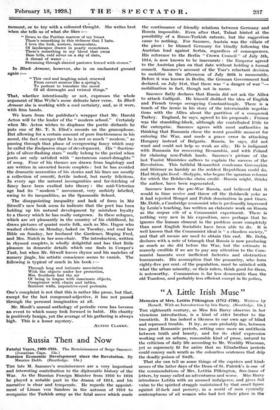Russia Then and Now
Fateful Years, 1909-1916. The Reminiscences of Serge Sazonov. (Jonathan Cape. 15s.)
Russian Economic Development since the Revolution. By Maurice Dobb. (Routledge. 15s.)
THE late M. Sazonov's reminiscences are a very important and interesting contribution to the diplomatic history of the War. As the Russian Foreign Minister from 1910 to 1916 he played a notable part in the drama of 1914, and his
narrative is clear and temperate. He regards the appoint- ment of Liman von Sanders in the autumn of 1918 to reorganize the Turkish army as the fatal move which made
the continuance of friendly relations between Germany and Ruksia impossible. Even after. that, Talaat hinted at the possibility of a Russo-Turkish entente, but the suggestion came to nothing. For Sazonov, Austria was the villain of the piece : he blamed Germany for blindly following the Austrian lead against Serbia, regardless of consequences. His reference to the Berlin " Crown Council " of July 5th, 1914, is now known to be inaccurate : the Emperor agreed to the Austrian plan on that date without holding a formal council. Sazonov's account of the Tsar's reluctant decision to mobilize in the afternoon of July 30th is memorable. Before it was known in Berlin, the German Government had declared, on July 31st, that there was " a danger of war "— mobilization in fact, though not in name.
Sazonov flatly declares that Russia did not ask the Allies to attack Gallipoli. He himself disliked the idea of English and French troops occupying Constantinople. There is a touch of the ironic in his story of the interminable negotia- tions with the Allies about the partition of a conquered Turkey. England, he says, agreed to his proposals ; France was the stumbling-block, although she contributed little to the enterprise. Sazonov agrees with most authorities in thinking that Rumania chose the worst possible moment for entering the War, and made a grave error in attacking Hungary instead of Bulgaria. Russia, he says, did not want and could not help so weak an ally. He is indignant with Rumania for recovering Bessarabia, and with Poland for claiming non-Polish lands. Sazonov's picture of the last Tsarist Ministries suffices to explain the success of the Revolution. This faithful Monarchist condemns Goremykin and Stiirmer as harshly as the reddest Republican could do. Had Stolypin lived—Stolypin, who began the agrarian reforms for which the Bolsheviks claim credit—Russia might, thinks the author, have been regenerated.
Sazonov knew the pre-War Russia, and believed that it would in time revive and throw off the Bolshevik yoke as it had rejected Mongol and Polish domination in past times.
Mr. Dobb, a Cambridge economist who is profoundly impressed
by Lenin's teaching, has written an elaborate work on Russia as the corpus vile of a Communist experiment. There is
nothing very new in his exposition, save perhaps that he ignores the human element in the problem more completely than most English Socialists have been able to do. It is well known that the Communist ideal is " a classless society," and that all means are used to obtain this end. Mr. Dobb declares with a note of triumph that Russia is now producing as much as she did before the War, but the estimate is scarcely credible if we are to pay any attention to the Com- munist laments over inefficient factories and obstructive bureaucrats. His assumption that the peasantry, who form eighty-five per cent. of the population, must be satisfied with what the urban minority, or their rulers, think good for them, is noteworthy. Communism is far less democratic than the old Tsardom, and probably less efficient except in its police.






































 Previous page
Previous page